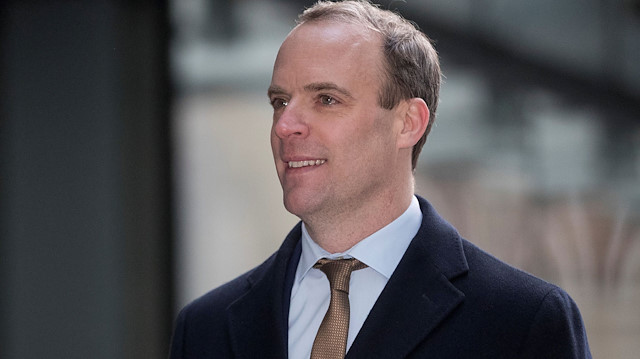
British foreign minister Dominic Raab said on Sunday he understood why the United States had killed a top Iranian military commander but urged a de-escalation of tensions in the Middle East to avoid war in the region.
Iran condemned Donald Trump as a "terrorist in a suit" after the U.S. president threatened to hit 52 Iranian sites if Tehran attacks Americans or U.S. assets in retaliation for the killing of Qassem Soleimani on Friday.
Raab, who is due to meet with U.S. Secretary of State Mike Pompeo in Washington on Thursday, said he had spoken to Iraq's prime minister and president and also planned to speak to Iran's foreign minister later on Sunday.
"We want to de-escalate the tensions, we want to see a route through this crisis. We do not want to see a major war in the Middle East. The only group or players that would benefit from that would be the terrorists and Daesh," he told the BBC.
Raab said Soleimani was a "regional menace" and he understood "the position the Americans found themselves in".
Asked if the killing was legal, Raab said: "It was General Soleimani’s job description to engage proxies and militias ... to attack Western countries that were legitimately there and in those circumstances the right of self defence clearly applies."
Raab said Britain, which on Saturday warned its citizens against travel to Iraq and Iran, was taking "every essential measure" to reduce the risk to British nationals, diplomatic missions and military personnel.
He said the leadership in Tehran needed to know that there was a diplomatic way out.
"There is a route through which allows Iran to come in from out of the international cold," he told Sky News. "We need to contain the nefarious actions of Iran but we also need to deescalate and stabilise the situation."
Opposition Labour lawmaker Keir Starmer, the bookmakers' favourite to win the party's upcoming leadership contest, said the killing of Soleiman was the "unilateral act of an irrational and erratic president".
"We cannot blindly follow the Americans into what could well turn out to be a war in the Middle East," he told the BBC.
Hello, the comments you share on our site are a valuable resource for other users. Please respect other users and different opinions. Do not use rude, offensive, derogatory, or discriminatory language.
The floor is all yours.








